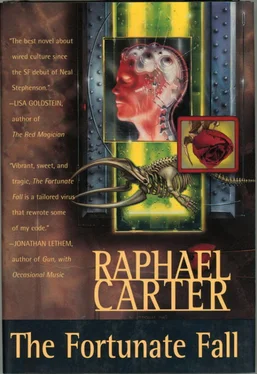Raphael Carter - The Fortunate Fall
Здесь есть возможность читать онлайн «Raphael Carter - The Fortunate Fall» весь текст электронной книги совершенно бесплатно (целиком полную версию без сокращений). В некоторых случаях можно слушать аудио, скачать через торрент в формате fb2 и присутствует краткое содержание. Город: New York, Год выпуска: 1996, ISBN: 1996, Издательство: Tor Books, Жанр: Киберпанк, на английском языке. Описание произведения, (предисловие) а так же отзывы посетителей доступны на портале библиотеки ЛибКат.
- Название:The Fortunate Fall
- Автор:
- Издательство:Tor Books
- Жанр:
- Год:1996
- Город:New York
- ISBN:0-312-86034-X
- Рейтинг книги:3 / 5. Голосов: 1
-
Избранное:Добавить в избранное
- Отзывы:
-
Ваша оценка:
- 60
- 1
- 2
- 3
- 4
- 5
The Fortunate Fall: краткое содержание, описание и аннотация
Предлагаем к чтению аннотацию, описание, краткое содержание или предисловие (зависит от того, что написал сам автор книги «The Fortunate Fall»). Если вы не нашли необходимую информацию о книге — напишите в комментариях, мы постараемся отыскать её.
“Gripping…. One of the most promising SF debuts in recent years”.
—“Publisher’s Weekly” starred review
The Fortunate Fall — читать онлайн бесплатно полную книгу (весь текст) целиком
Ниже представлен текст книги, разбитый по страницам. Система сохранения места последней прочитанной страницы, позволяет с удобством читать онлайн бесплатно книгу «The Fortunate Fall», без необходимости каждый раз заново искать на чём Вы остановились. Поставьте закладку, и сможете в любой момент перейти на страницу, на которой закончили чтение.
Интервал:
Закладка:
Regretfully, I passed up the aside on peace—too easy a target— and homed in on the essential. “There are a lot of different people on the Net,” I said. “Who’s missing?”
“Animals,” he said.
“What?”
“Animals. Think about it. We have the means to span the greatest gap there is, not just between one human and another, but between us and other forms of life. We could reproduce, in the human mind, the circuits that enable dolphins to use sonar, or pigeons to come home. We could know what it is like to be a bat, a whale, a sparrow—but only a few clever hackers do so, and only until they are caught by the Weavers. That alone should raise grave questions in your mind.”
“So,” I said dryly, “aside from our furred and feathered friends, who exactly is it that’s, ah, underrepresented?”
“Drunks,” he said, as if at random. “Addicts, wireheads. The desperate and the dissipate. Or for that matter, Christians, Muslims—we can’t have people going about believing in Hell; it causes ever so much anguish. And just try to find a homosexual. You’ll search in vain for years.”
Still keeping my mind blank, I let my eyes stray to the samovar.
“I must confess,” he said, ignoring me, “it is a most delicious irony. Christians and homoamorists, those age-old enemies, living in peace at last—not because they have at last resolved their ancient quarrel, but because they no longer remember the grounds of it: lost souls, united in the brotherhood of amnesia. The lion shall lie down with the lamb, because we’ve told them they’re both rabbits.”
I thought back to the last thing that did not apply to me, and answered that. “You gave me a list of people that are never seen on the Net. What if I tell you that I’ve seen all of them? News One cameras have interviewed wireheads, for example. More than once. I think you’ve been watching the wrong channels.”
“Oh yes,” he said bitterly, “the exhibition interview. Here they are, the ones you never see—talk to them, look at them, pinch them!”
“I don’t see the problem.”
He exploded: “Don’t you see, it does not matter if we look at them! We must look in them! The Fusion will never be free until the cameras become dissidents or the dissidents become cameras. It is not enough to send out cameras to see and hear them; sight and sound are dying media—dying, if not dead already. We must feel them. We must know their thoughts. Who is missing, you ask me? All of us are missing. Everyone but a few thousand cameras—”
“Tens of thousands.”
“What difference does it make? They’re all the same. It’s the same viewpoint you see, every time, whether it’s a soap-channel camera whose brain-makeup paints her as the banal parody of a ravished bride, or a News One camera interviewing a crazy old man with a whale in his basement. They are all clones of each other.”
“I am not a clone,” I said.
“No,” he said, suddenly thoughtful. “You’re not. You’re the stepsister who cut off her heel to fit the glass slipper—or rather, her brainstem to fit the glass skull. But the blood told, Maya Tatyanichna. The blood told, as blood will.”
“Erase that,” I said aloud. Horus appeared behind Voskresenye’s head, nodded briefly, was gone.
“Oh, all right then,” Voskresenye said, highly amused. “I will give you the generic version that you seem to crave. It is very simple. Anything in a Netcaster that doesn’t conform to the official vision of humanity is screened out. If it can’t be screened out, it is filtered out. And if it is too big to screen or filter, they put a cable in your head and tear it out of you.”
“And what do you think you can do about it?”
“In the Netcast that your unfortunate audience is presently viewing, I have recorded all the ways in which the Army’s vision of humanity is enforced. And I have gathered in everything that is dangerous and messy and petty and horrible and human, to give it back. I have tracked down every form of vice and dissidence—all save one. And that too I think I will manage before long.”
Unnerved by his expression, I said, “What good do you think you can possibly do? People will just turn it off.”
“Oh, Andreyeva, I had thought better of you,” he said scornfully. “What I have shown the world is terrible and painful, parts of it; but it is something new —or rather, something so old and so long-forgotten that it will seem new. There are those who will listen.”
“Not if Netcast shuts it off, they won’t,” I said. “In fact, they must already have shut it off. I’m hardly getting any feedback.”
“I am certain that our audience is dwindling by the second,” he said coolly. “It matters not at all. The whale will ensure that it gets out.”
I leaned forward. “You mean that the whale can control—”
“No, no. I don’t mean the whale herself will do it; I mean the idea of the whale, the hysteria about the whale. This is the Net-cast of the year—you know that. Every advertiser wants his viruses in it, and every distributor wants the fees for carrying the viruses; they are fighting News One even now. They will fail in most places, but somewhere, in some obscure corner, they will succeed. And if it is seen by one person, it will be seen by everyone. Anything connected with the whale will be distributed. The demand will find it—even if it has to be ripped out of your head, Maya Tatyanichna.”
I felt a wave of fear that wasn’t feedback. “What good will it do?” I asked, more plaintively than I had meant to. “So people feel what it’s like to be—a Christian, whatever—once. They’ll only forget. A year from now, it will all be as though it never happened.”
“But I have also shown them how homogeneity is enforced; and that is something they will not forget so quickly.”
“They already know that,” I hissed. “Do you think there’s a person in Russia who doesn’t fear the Weavers?”
“Resentment gains by being given a focus,” he said. I started to interrupt, but he cut me off, saying: “I did not claim that I would beat the Weavers overnight, Maya Tatyanichna. I have struck the blow that I can strike; others will carry it forward, or they will not. But now we come to the other reason for my action, which is much more pressing.”
He fell silent. “I’m listening,” I said.
“I told you of my adventure with the encryption virus,” he said slowly. “About how, under cover of a failed attempt to take control of certain programs, my cohorts and I changed those programs—doing it subtly at first, and expanding slowly, so that the change was imperceptible. From this there was a logical conclusion: could you not do the same thing with minds?” He shook his head sadly. “It took me far too long to realize that. I have reason to believe that the Weavers had thought of it some time before.”
“You think they somehow altered our minds?”
“They are doing so even now. They are trying to hack the archetypes—to change what makes us human. You might say they’re trying to revoke original sin.”
“How do you know?”
“I have found the vector.”
“Some kind of worm program?”
“Not a single program; an entire ecosystem. The change they wish to make has been divided into a thousand independent parts— many thousands, perhaps; I do not know how many are still unfound, or perhaps still unreleased into the world. Each of these infinitesimal parts is carried by not one, but three viruses.”
“For redundancy?”
“Quite the reverse. Suppose that I gave you three slides, one with a picture of a boat, one with a landscape, one with a distant bird beneath a cloud. Alone, each seems to have its own crude purpose; but project the three together, and the boat becomes a mouth, the sail a nose, the bird an eye, the clouds a lock of hair. If you transmit the slides by different routes, this is an excellent way to send a secret message. And that is what the Weavers have done. Each virus packs a small payload—a few dozen neurodes or lines of code, with some irritating but harmless function, destined for a particular address in moist or dry memory. The next triplet loads itself into the same place, interlacing with the first. And when the third arrives, it overwrites the last of the camouflage code, and the resulting program carries out its true purpose. Imperceptibly, a tiny sliver of the soul is changed. The code then disappears, having served its purpose. Since it is active for such a brief period, it is almost undetectable.”
Читать дальшеИнтервал:
Закладка:
Похожие книги на «The Fortunate Fall»
Представляем Вашему вниманию похожие книги на «The Fortunate Fall» списком для выбора. Мы отобрали схожую по названию и смыслу литературу в надежде предоставить читателям больше вариантов отыскать новые, интересные, ещё непрочитанные произведения.
Обсуждение, отзывы о книге «The Fortunate Fall» и просто собственные мнения читателей. Оставьте ваши комментарии, напишите, что Вы думаете о произведении, его смысле или главных героях. Укажите что конкретно понравилось, а что нет, и почему Вы так считаете.












